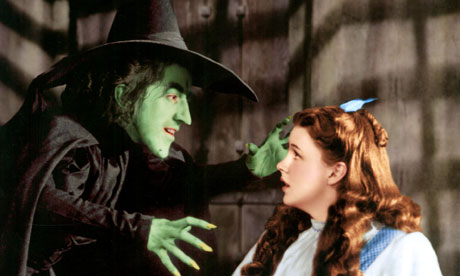Britain enters the 8th stage of grief: 'loopiness'
BBC chief to decide on Ding Dong after Thatcher press storm
Director general stresses corporation's independence as Mail and Telegraph lead outcry over Facebook campaign
Lisa O'Carroll
guardian.co.uk, Friday 12 April 2013 14.18 BST
Source:
http://www.guardian.co.uk/media/2013/apr/12/bbc-chief-ding-dong-thatcher?CMP=A2Kmofo
The new BBC director general, Tony Hall, will have the final say on whether Radio 1 will play Ding Dong the Witch is Dead, the Wizard of Oz song being pushed up the charts by anti-Thatcher protesters, on its chart show on Sunday.
 BBC chief Tony Hall is to decide on whether Radio 1 will play the Ding Dong song after the Thatcher press storm. Photograph: Everett Collection /Rex
BBC chief Tony Hall is to decide on whether Radio 1 will play the Ding Dong song after the Thatcher press storm. Photograph: Everett Collection /Rex
Hall will be "taking the lead" on the decision on whether to play the track on Radio 1's Official Chart show, a senior BBC insider confirmed to MediaGuardian.
"The director general will be one of the three people making the decision," the senior source added.
Hall told staff on Thursday that he personally thought the song and the accompanying social media campaign launched following Margaret Thatcher's death on Monday by people protesting against the former Conservative prime minister's 1980s policies was "tasteless", but stressed that the editorial independence of the BBC was sacrosanct.
The former Royal Opera House chief executive and BBC News director has been pitched into his first major political controversy barely a week after taking over the top job at the corporation, with the Daily Mail and Daily Telegraph both splashing on the BBC's refusal to ban the song and Tory MPs calling on the corporation not to play it.
Supporters of Thatcher have racheted up the pressure on the BBC and Hall over the Ding Dong song with Gerald Howarth, the Conservative MP and friend of the late prime minister, telling the Daily Telegraph the director general would be guilty of "a serious dereliction of duty" if it was aired.
John Whittingdale, a Tory MP and chairman of the Commons culture, media and sport select committee, told the Daily Mail: "This is an attempt to manipulate the charts by people trying to make a political point. Most people will find that offensive and deeply insensitive."
Whittingdale said ultimately it was a matter for Hall, "who will be appearing before my committee in two weeks".
The Daily Mail splashed on the story on Friday with the headline "BBC Witch Song Insult to Maggie", telling readers Radio1 was "to play single driven up charts by Thatcher haters".
Friday's Daily Telegraph front page splashed with the headline "BBC chief refuses to ban Thatcher death song".
Normally the decision on what tracks to play on the weekly Radio 1 chart show is taken on Sunday mornings when the final sales data is collated.
But the senior BBC source confirmed Hall is now fully involved in the decision-making process alongside the acting director of radio, Graham Ellis, and Ben Cooper, the Radio 1 controller.
The Official Charts company revealed on Friday that Ding Dong is now on track to be number three in the charts, behind Duke Dumont and Pink, but could be dislodged by the hugely popular South Korean singer Psy, whose new single Gentleman was released on midnight on Thursday.
Just under 29,000 singles of the 1939 Wizard of Oz track had been bought by midnight on Thursday, compared to 40,000 sales for Duke Dumont, who was on track to be number one.
On Friday, Ding Dong had clinched the number one slot on the iTunes charts, up from 2nd place the previous day, a signs that sales were continuing to grow.
Hall will be particularly mindful of the downfall of his predecessor George Entwistle, who resigned after just 54 days as director general in November, overwhelmed by the Jimmy Savile scandal and subsequent Newsnight debacle when the BBC2 current affairs show falsely linked former Tory chairman Lord McAlpine with an allegation of child sex abuse.
The new director general and his PR advisers will be keenly aware that Entwistle contributed to his own demise by appearing to take a hands off approach to the escalating scandal. This led to him being branded "incurious George" by the media.
Entwistle's disastrous final Today interview with John Humphrys on Saturday 10 November included his admission that he did not become aware of Newsnight's McAlpine film until the day after transmission and did not read a subsequent Guardian front-page story raising doubts about the accuracy of the report. Entwistle resigned 12 hours after his Humphrys encounter.